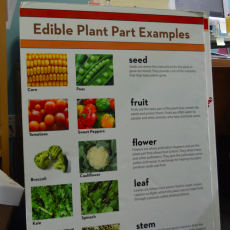






When REAP’s Farm to School program provides a healthy snack, students not only receive a serving of fruits or vegetables but also an information sheet about the snack.
This is because REAP’s Farm to Food program is as much about teaching students healthy, local food in schools as it is about feeding them.
 AmeriCorps volunteers help students learn the ABCs of peas, and other vegetables. (Jen Gragg/Madison Commons)
AmeriCorps volunteers help students learn the ABCs of peas, and other vegetables. (Jen Gragg/Madison Commons)
The Farm to School program partners with both USDA’s Fresh Fruit and Vegetable program, the source of the healthy snacks above, and the Madison Metropolitan School District’s Food and Nutrition department, which helps incorporate healthy local food into school lunches.
The Farm to School program also places four AmeriCorps members into the classrooms each year to teach students about healthy eating.
Establishing healthy eating habits early can lead to a lifetime of healthy eating. For Jill Carlson, a former AmeriCorps member with the Farm to School program, this type of exposure is crucial.
“During a lesson, kids are getting a fruit or a vegetable or both in their diet for the day,” she said. “So they’re getting exposed to more fruits and vegetables. Researchers say it takes something like 20 exposures to a certain food for kids to be won over.”
Garden bars often find their ways onto lunch trays using this program. These salad bars incorporate fresh, local fruit and vegetables, which are higher in nutrients.
“I see the cafeteria as being as much of an educational tool as the classroom,” said Farm to School Director Natasha Smith. “For example, eating locally grown food is a huge opportunity to have a positive impact in ways beyond your own health.”
The teaching component of the Farm to School program helps students understand these other impacts of eating local food, whether economic or environmental.
Learning about local food in particular allows students to understand the importance of supporting a local economy. It also makes the experience of eating healthy foods more personal since they have a more intimate understanding of who is growing their food.
Students also learn about the importance of sustainability. They learn how growing something sustainably saves the soil and prevents harmful chemicals from getting into their food.
Teaching about healthy eating has become a natural part of the school day for school’s participating in the REAP Farm to School program.
 Natasha Smith is the Farm to School program's director. (Jen Gragg/Madison Commons)“We talk about health in a very holistic way,” said Carlson. “As guest teachers we’re able to tell the teachers that this won’t derail their day because we can integrate a lot of school subjects.”
Natasha Smith is the Farm to School program's director. (Jen Gragg/Madison Commons)“We talk about health in a very holistic way,” said Carlson. “As guest teachers we’re able to tell the teachers that this won’t derail their day because we can integrate a lot of school subjects.”
Topics such as sustainability, the nutrient cycle and the local economy can easily be incorporated into science and math. Even English can have a sustainability component.
“We have a giant poster board, and it has a whole list of words that are advanced terms used to describe how food tastes or smells or looks like. We want them to think more critically about why they like or don’t like something. It also helps students learn new adjectives,” said Carlson.
The AmeriCorps members will spend six weeks with one class, meeting once a week to go over a new lesson plan. Even though their time with the students is short, the response from the students often is a positive one.
“I was surprised at how quickly we earned the respect of the students,” said Carlson. “It was a great indicator to us that what we’re doing does get them excited and that they look forward to it.”
Now the program is looking to expand its reach.
“We’ve been trying to get more and more parental involvement these past couple of years,” said Smith. “We did a new community event last May called family food fest. The idea behind it was that we need to expand our education to parents and to school staff and to the broader community in general.”
|
|
|
Welcome to the Madison Commons, a website designed to provide news and information about all of Madison's neighborhoods and a crossroads for the discussion of community issues. The name comes from the idea of a village commons, a place for news, talk, debate, and some entertainment, too, that's open to everyone.
All rights reserved. Read more about the Madison Commons and its partners.

